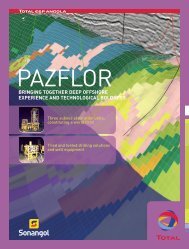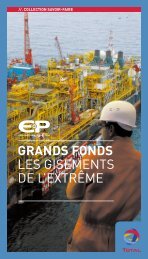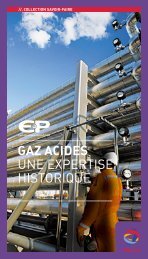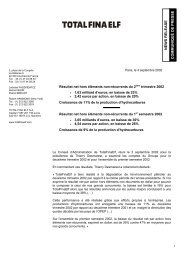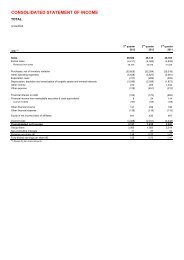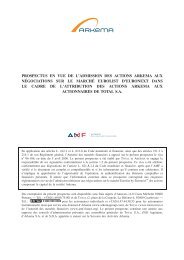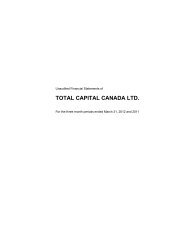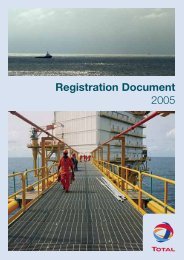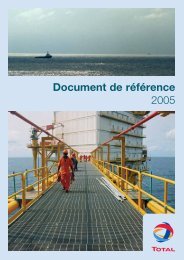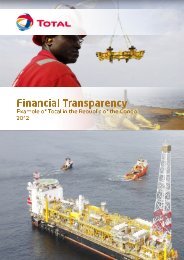Registration document 2007 - Total.com
Registration document 2007 - Total.com
Registration document 2007 - Total.com
You also want an ePaper? Increase the reach of your titles
YUMPU automatically turns print PDFs into web optimized ePapers that Google loves.
11<br />
Over and above the prevention policy, the Group’s operational<br />
entities are required to establish emergency plans in the event<br />
of an accident. These plans are regularly updated and verified<br />
with the relevant Environment and Safety departments, and<br />
feedback from experience is systematically organized. These<br />
policies for prevention and site clean-up in the event of an<br />
accident are operational not only for industrial sites, but also for<br />
the transport of hazardous goods, where <strong>com</strong>parable actions<br />
and procedures are in place.<br />
• The principles relating to staff revolve around three ideas:<br />
all employees have a responsibility at their level in terms of<br />
safety and the environment; they must be aware of this and act<br />
accordingly. Work is assessed hierarchically according to these<br />
and other criteria. To flesh out these principles, TOTAL S.A.’s<br />
Environment and Safety department organizes training both for<br />
management and for health, safety and environment officers.<br />
Training for emergencies, crisis management and providing<br />
feedback is also in place. The business units also offer<br />
numerous courses appropriate for the various staff responsible<br />
for these functions.<br />
• Regarding relations with third parties, the charter<br />
re<strong>com</strong>mends that outside service providers, suppliers, and industrial<br />
and <strong>com</strong>mercial partners generally adhere to the Group’s Safety<br />
and Environment policy. It also emphasizes that the expectations of<br />
the unions, customers, shareholders, and other parties involved in<br />
relations that affect the environment must be satisfied, in an attitude<br />
of constructive dialogue and transparency. Particular attention is<br />
paid to relations with the neighboring <strong>com</strong>munity, and pilot<br />
programs for close partnerships, dialogue and concerted action, in<br />
which the Group’s above-stated approach to the social and<br />
environmental relationship is reflected, are being conducted around<br />
certain sites. These are intended to be<strong>com</strong>e more widespread<br />
depending on the experience on the ground.<br />
The structure of the Group’s entities ensures that they constantly<br />
and effectively take into account the environment in all their<br />
activities. Centrally, the Sustainable Development and<br />
Environment department (Développement Durable et de<br />
l’Environnement – “DDE”) presides over the environment network<br />
in order to facilitate exchanges and synergies between the units.<br />
The actions and policies of the DDE and the Industrial Safety<br />
department within TOTAL S.A. are coordinated in the Strategy<br />
and Risk Evaluation department.<br />
The Sustainable Development and Environment departments and<br />
the Industrial Safety department of the business units convey to<br />
the subsidiaries, who then pass them on to the industrial sites,<br />
the principles for action and the short- and medium-term<br />
environmental objectives that they have established in joint<br />
working parties.<br />
All the Group’s business units thus have each established,<br />
according to the specific requirements of their regional site and<br />
activities, internal management systems in the environmental area<br />
and in safety and quality. This involves a determined and<br />
280<br />
Appendix 3 - TOTAL S.A.<br />
Social and environmental information<br />
TOTAL - <strong>Registration</strong> Document 2006<br />
concerted approach, based on information, working together,<br />
raising the awareness of staff and delivering training to them.<br />
Progress objectives are defined and action plans implemented;<br />
the results obtained are measured using methodologies and<br />
indicators that are progressively developed and refined; and<br />
feedback and associated controls in the form of audits are<br />
conducted. These management systems are the subject of<br />
periodic evaluation by internal auditors in order to continually<br />
optimize them.<br />
Within the Group, monitoring of the practical implementation of<br />
the principles of the Health, Safety, and Environment (HSE)<br />
Charter by the various entities is of considerable importance.<br />
When internal audits and environmental inspections of any kind<br />
are conducted by the relevant departments, the way in which the<br />
principles of the charter are implemented is included in the items<br />
verified. To facilitate this monitoring, the reporting processes for<br />
performance and events are constantly harmonized and<br />
improved at the entities, as well as between these entities and<br />
the central departments. In addition, in order to consolidate the<br />
reliability of these reporting procedures, their verification by an<br />
external organization is now incorporated in the Group’s<br />
procedures. Following a mock audit in 2005, the verification of<br />
environmental reporting data has been conducted by the auditors<br />
at a dozen sites, chosen each year by the auditors. The first<br />
survey report conducted in 2006, which was included in the<br />
<strong>Registration</strong> Document for 2005, covered five indicators that<br />
were assessed with regard to their relevance, reliability,<br />
objectivity, <strong>com</strong>prehensibility and exhaustiveness.<br />
This desire to continually achieve better-integrated management<br />
of the environment has led the Group to work towards ISO<br />
14001 environmental certification. Because this international<br />
benchmark is awarded by certification from a third party,<br />
following independent audits for <strong>com</strong>pliance that are repeated<br />
every three years, it allows for external recognition of<br />
environmental management systems. In Europe, in Refining &<br />
Marketing and Chemicals, the majority of sites (about one<br />
hundred) have now been certified; for the other activities and<br />
outside Europe, the certification process is actively underway. In<br />
addition, the objective of certification of 75% of the Group sites<br />
considered as particularly important for the environment is<br />
expected to be reached for <strong>2007</strong>; by the end of 2005, over half<br />
these sites had been certified.



